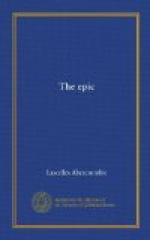by exquisite beauties and dignities, indeed by incomparable
lines, but because the poem as a whole does, as it
goes on, accumulate an immense pressure of significance.
All the great epics of the world have, however, perfectly
clearly a significance in close relation with the
spirit of their time; the intense desire to symbolize
the consciousness of man as far as it has attained,
is what vitally inspires an epic poet, and the ardour
of this infects his whole style. Morris, in this
sense, was not vitally inspired.
Sigurd the Volsung
is a kind of set exercise in epic poetry. It
is great, but it is not
needed. It is,
in fact, an attempt to write epic poetry as it might
have been written, and to make epic poetry mean what
it might have meant, in the days when the tale of Sigurd
and the Niblungs was newly come among men’s
minds. Mr. Doughty, in his surprising poem
The
Dawn in Britain, also seems trying to compose an
epic exercise, rather than to be obeying a vital necessity
of inspiration. For all that, it is a great poem,
full of irresistible vision and memorable diction.
But it is written in a revolutionary syntax, which,
like most revolutions of this kind, achieves nothing
beyond the fact of being revolutionary; and Mr. Doughty
often uses the unexpected effects of his queer syntax
instead of the unexpected effects of poetry, which
makes the poem even longer psychologically than it
is physically. Lander’s
Gebir has
much that can truly be called epic in it; and it has
learned the lessons in manner which Virgil and Milton
so nobly taught. It has perhaps learned them
too well; never were concision, and the loading of
each word with heavy duties, so thoroughly practised.
The action is so compressed that it is difficult to
make out exactly what is going on; we no sooner realize
that an incident has begun than we find ourselves
in the midst of another. Apart from these idiosyncrasies,
the poetry of
Gebir is a curious mixture of
splendour and commonplace. If fiction could ever
be wholly, and not only partially, epic, it would
be in
Gebir.
In all these poems, we see an epic intention still
combined with a recognizably epic manner. But
what is quite evident is, that in all of them there
is no attempt to carry on the development of epic,
to take up its symbolic power where Milton left it.
On the contrary, this seems to be deliberately avoided.
For any tentative advance on Miltonic significance,
even for any real acceptance of it, we must go to poetry
which tries to put epic intention into a new form.
Some obvious peculiarities of epic style are sufficiently
definite to be detachable. Since Theocritus,
a perverse kind of pleasure has often been obtained
by putting some of the peculiarities of epic—peculiarities
really required by a very long poem—into
the compass of a very short poem. An epic idyll
cannot, of course, contain any considerable epic intention;
it is wrought out of the mere shell of epic, and avoids




